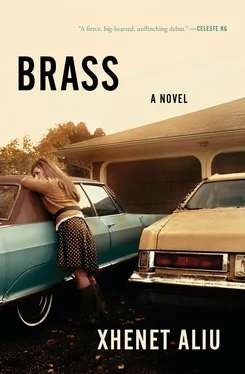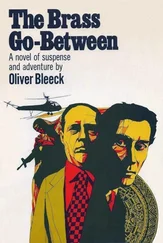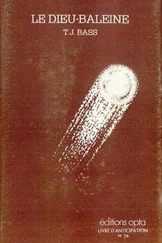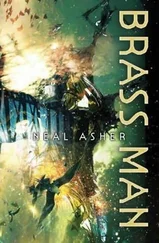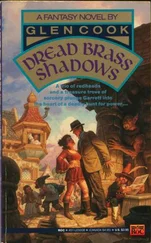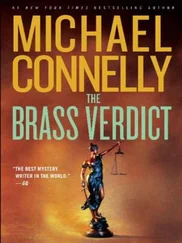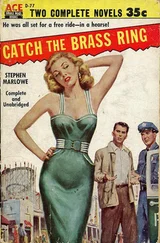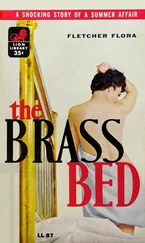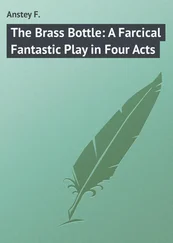“I can’t drink booze.”
“Oh, sure you can. That doesn’t count toward the end.”
My high school health teachers had never mentioned anything about the threat of fetal alcohol syndrome expiring in the third trimester, but nobody protested about the cup in my hand, so I took a sip, and then a few, and by the end of it I was able to muster the smile I wished I didn’t have to fake.
The shower was at Yllka’s, and people commented on how well that worked out, since we wouldn’t have to drive all these presents back home, just drag them upstairs when everything was all over. Deena started handing me the presents that people had bothered to wrap, all of them tagged with two-inch cards printed with violets or rattles.
“Thanks, Dardata,” I said, folding the little terry bath towel back into its box. “This is perfect.”
She smiled a little, maybe even for real.
All of the things in miniature worked an opposite kind of spell on us. The tinier the object, the bigger the smile it put on a face. Somehow a plastic spoon was adorable because it was shrunken. The newborn-size diapers, each one the width of a fist, made everyone swoon.
“The shit isn’t as cute, I promise you,” Deena said, and everyone laughed but it wasn’t clear if anyone agreed. Everyone volunteered to take a turn wiping the baby’s butt when the time came, as if changing a diaper were some kind of privilege. Even the gruas were reaching out, taking turns placing their hands on my belly to feel the kicking. Greta took a turn, and tried her best not to smile when she felt the movement inside of me.
“What’s the due date?” Rini asked.
“April first,” I said.
“Ha, April Fools’ Day,” Mamie said. “Perfect.”
“Do you have names picked out?” Dardata asked. She was looser by then, holding a cup of punch in one hand and the other shaking a rattle along to “Macarena,” which made up about every third song on the mix tape she’d brought along.
Christ, babies needed names, too. Names and crib bumpers and spiked punch for the ninth month in utero.
I shrugged. “We’re not sharing yet.”
“Ugh, it drives me crazy when people keep everything a secret. Boy or girl, name, it’s like you’re the Sphinx,” Dardata said, but she was smiling, because who doesn’t like a riddle?
Mamie wasn’t smiling. “Why don’t we ask Daddy what the name is. Daddy?” she said. She was looking at the door, and so everyone’s eyes followed hers, and there he was, leaning against the frame as if he were keeping it in place. Once he started to walk toward us, I saw it was the frame that had been keeping Bashkim upright, and without it his knees buckled a little.
If I had been standing, I would have crumpled.
“What’s he doing here? Men aren’t allowed at showers,” Mamie said.
“He doesn’t look good,” Greta said.
“Mëmë,” Bashkim said, after he stumbled over to Mamie and kissed her on the lips.
“You stink,” she answered.
Even through all the punch in that room, I could make out the booze on Bashkim’s breath. His stupid grin and weeble-wobble gait meant he’d poured down more than a few at the social club, which meant the rest of the wives in the room knew what they were in for when they got home. They sighed, all together, like the all-knowing chorus in a musical.
“Party’s over, I guess,” Dardata said and threw the rest of her drink down her throat.
“No, party is happening! Stay, stay,” Bashkim said but didn’t even look at her to see the glare she was giving him. The gruas gathered their purses, patted my stomach on the way out, looked at me as if to say not just poor, poor you but poor, poor us .
“Thank you, thank you for these beautiful gifts,” Bashkim said to them on their way out, in a voice like that of an emcee. “So beautiful, all of you ladies. So beautiful, Roza,” he said to the old one, who shook his arm from her waist, whose scowling face and black mourning dress implied that she’d earned the right by then to be free from the clutches of any man, her husband or otherwise.
“And you, beautiful ladies,” he said, going down the line, grabbing the faces of Rini and Margot and Deena. “So kind to have a party for my Elsie and my baby. So many nice people around here, so many kind people.”
“I’ve never seen him like this,” I said, in what was supposed to be an explanation or apology. It was true that I had never seen him like that, but I had seen the aftermath, when he’d wake up to down the half gallon of Gatorade he’d stocked in the refrigerator the night before and then walk into the shower with a lit cigarette, the wet ashes left behind in the tub like dead insects.
“What does that mean, ‘like this’? I am happy. What is there not to be happy about? Good friends, good family. It is a dream come true, days like this.”
“Did you just drive here in your condition?” Mamie asked, the pot to Bashkim’s kettle.
“Oh, stop kidding, Mëmë, you know I am okay.”
“Who’s Mëmë? That’s not my name.”
“Mëmë, you know, mother,” he said. “Like a mother to me.”
“My name is Anna,” Mamie said.
“You’ll help us move some of this stuff to the apartment, eh?” Yllka asked, nodding to Rini, Margot, and Deena.
They scuttled upstairs. I grabbed a dirty tray so I could follow them up, but escape wasn’t as easy for me.
“I feel better, to know that Elsie will not be alone,” Bashkim said.
“What do you mean, ‘will not be alone’? What, are you planning on leaving her already?” Mamie asked. It was a rhetorical question, an insult really, but Bashkim stumbled into the living room and fell onto the couch and didn’t respond, and that terrified me, that he didn’t seem to have a fight in him at all.
“Get your dirty feet off of Yllka’s sofa,” I said to him. He was coiled up like a snake, and I wanted to poke at him, to see if he posed a threat or not.
“It’s gone,” he said.
I didn’t have to ask what was gone.
“Everything is gone,” he said anyway.
“Quiet,” I told him.
“What’s gone? Besides his mind, I mean?” Mamie asked.
I shook my head. “Not now,” I said.
“She is alone. There is nothing there for her,” he said.
“And what’s here for her?” I asked. “You?”
“What did you say to me?” Bashkim started to rise, but he lost momentum halfway up, and he collapsed onto his back, covering his face with his hands like a politician caught in a scandal, working his way through a crowd of photographers. Then he began sobbing, something I had never seen him do, something I didn’t even know he was capable of. I remembered from the news the image that struck me the most: among all the women on the streets of Tirana wailing, among all the men stomping on abandoned riot gear, there was one man alone who was sobbing, his wife still and dazed beside him. There was a space around him, as if even in all of the sadness and outrage the crowds were afraid to touch him, as if he were contagious. The crowds knew what to do with an angry man, but not a broken one.
“I’m sorry, I’m sorry,” he cried. I’d been waiting weeks for those words from him, but hearing them repulsed me, because they showed a kind of weakness we couldn’t afford anymore.
“What is he talking about? Who’s ‘she’?” Mamie asked.
Bashkim switched over to Albanian, which to Mamie and Greta must have sounded like a made-up tongue, a man in need of an exorcism instead of a shower and some hot coffee. Yllka returned from downstairs, and Gjonni followed her seconds afterward, and we all stood around staring down at him on the sofa like we were at his wake.
“My god,” Yllka said in English and then switched to Albanian, but by this point Bashkim had closed his eyes and stopped responding.
Читать дальше
